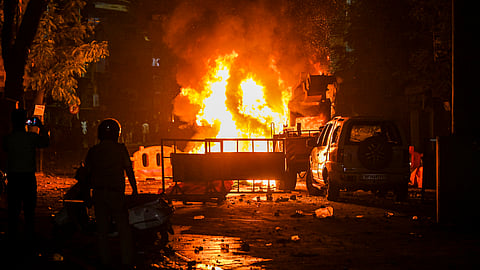

BENGALURU: Offences related to religion have witnessed a significant increase in the state, rising by 64.87% from 208 cases in 2021 to 345 cases in 2024.
As per data available with State Crime Records Bureau, until May this year, a total of 123 such cases were reported across the state. Cases of communal and religious riots also saw a 133.31% increase, rising from 9 in 2021 to 21 in 2024.
Experts say that misinformation on social media, a politically polarised environment, and long-standing religious or caste-based tensions in certain districts have contributed to the rise in such incidents.
Government initiatives like the formation of an anti-communal wing or a special action force are yet to make any impact.
Offences related to religion are being booked under various sections and are further categorised into caste-based, communal, linguistic, regional, religious, and other issues.
Speaking to TNIE, a serving police commissioner in the state reiterated that misinformation on social media, political polarisation, and historical religious or caste tensions are key contributors. “The police have failed to take preventive actions, such as arresting the accused or invoking the Goonda Act against troublemakers,” the commissioner said.
‘Religious violence, riots triggered by social media’
The commissioner added that at times, arrests are made in a discriminatory manner — an individual posting something on social media might be arrested swiftly, but if the person involved is a politician, action is often delayed.
“If any religious or communal issue arises, there is often direct political party backing on both sides. Political patronage for communal offenders, regardless of which party is in power, is not a new phenomenon in the state,” the officer said.
He said that riots and other religion-related issues could have been prevented through better intelligence gathering. “The state intelligence department and local intelligence units are weak. With Zilla Panchayat and Taluk Panchayat elections around the corner, political parties and their cadres are becoming active,” the officer added.
While the government has announced several special measures like an anti-communal wing and a special action force, the IPS officer said these initiatives remain on paper, often announced as reactive measures. The government must encourage strict against offenders.
Another IPS officer serving as an SP of a district said, “A sense of communal hatred has taken root in society. People have become intolerant even to minor mistakes or mischief by other communities.
If a religious procession causes even a small disturbance or damage, it is not taken in a constructive spirit.” Long-standing religious and caste-based tensions in some districts continue to be a problem. Offenders often manage to escape the criminal justice system, which only encourage them further. Conviction rates in such cases remain very low, he noted.
Another IPS officer said that currently, violence related to religion are triggered by social media. The situation escalates further through comments on such posts.
Earlier, tensions were limited to a particular place, but now, due to social media, they spread across the entire state. However, since communal issues flare up due to social media, the police are monitoring online platforms, taking strict action where necessary, and are engaging in community outreach programmes to improve the intelligence network with local leaders, the officers said.